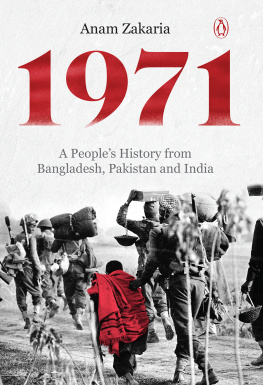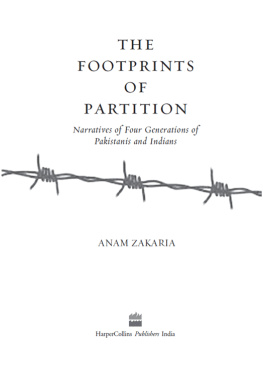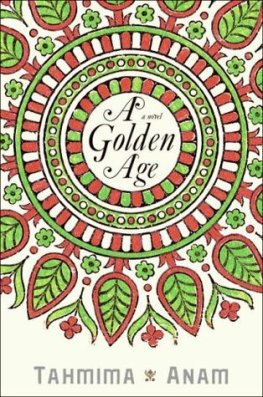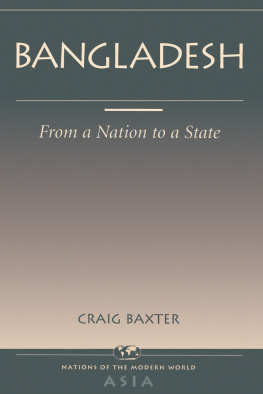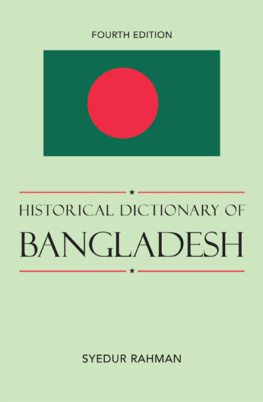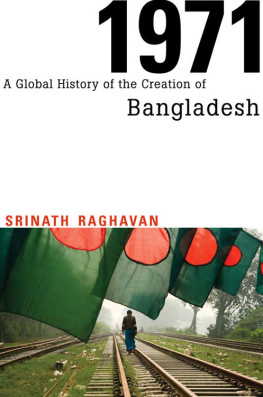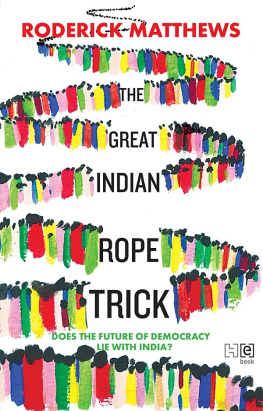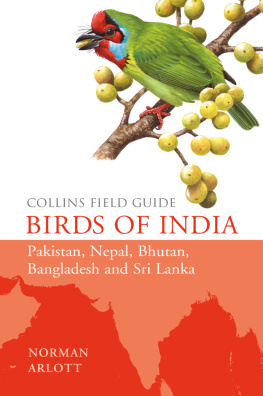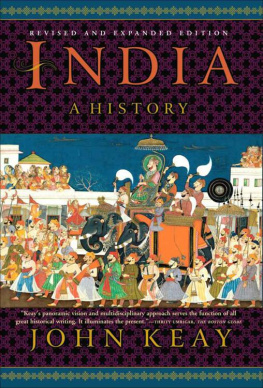Anam Zakaria - 1971: A Peoples History from Bangladesh, Pakistan and India
Here you can read online Anam Zakaria - 1971: A Peoples History from Bangladesh, Pakistan and India full text of the book (entire story) in english for free. Download pdf and epub, get meaning, cover and reviews about this ebook. year: 2019, publisher: Penguin Random House India Private Limited, genre: Politics. Description of the work, (preface) as well as reviews are available. Best literature library LitArk.com created for fans of good reading and offers a wide selection of genres:
Romance novel
Science fiction
Adventure
Detective
Science
History
Home and family
Prose
Art
Politics
Computer
Non-fiction
Religion
Business
Children
Humor
Choose a favorite category and find really read worthwhile books. Enjoy immersion in the world of imagination, feel the emotions of the characters or learn something new for yourself, make an fascinating discovery.
- Book:1971: A Peoples History from Bangladesh, Pakistan and India
- Author:
- Publisher:Penguin Random House India Private Limited
- Genre:
- Year:2019
- Rating:4 / 5
- Favourites:Add to favourites
- Your mark:
- 80
- 1
- 2
- 3
- 4
- 5
1971: A Peoples History from Bangladesh, Pakistan and India: summary, description and annotation
We offer to read an annotation, description, summary or preface (depends on what the author of the book "1971: A Peoples History from Bangladesh, Pakistan and India" wrote himself). If you haven't found the necessary information about the book — write in the comments, we will try to find it.
Anam Zakaria: author's other books
Who wrote 1971: A Peoples History from Bangladesh, Pakistan and India? Find out the surname, the name of the author of the book and a list of all author's works by series.
1971: A Peoples History from Bangladesh, Pakistan and India — read online for free the complete book (whole text) full work
Below is the text of the book, divided by pages. System saving the place of the last page read, allows you to conveniently read the book "1971: A Peoples History from Bangladesh, Pakistan and India" online for free, without having to search again every time where you left off. Put a bookmark, and you can go to the page where you finished reading at any time.
Font size:
Interval:
Bookmark:




PENGUIN BOOKS

PENGUIN BOOKS
1971: A Peoples History from Bangladesh, Pakistan and India poignantly brings out how 1971 is one of the originary wounds not only for Bangladesh but also for Pakistan and India, the ramifications of which are felt particularly today. In thinking through the relation[ship] between [a] nation and the memorialization in South Asia, Anam Zakaria, in her travails [while navigating] through the myriad permitted narratives and historiographies of these three children of Partition, shows the lasting traces of 1971 on the essence of these three countries. Exploring memoirs, school textbooks, oral history accounts, history-writing processes, museums and memorials, Zakarias timely book carries a temporal and moral imperative in a context where the losses of 1971 are not forgiven by history. By decentring the role of India, Bangladesh and Pakistan beyond the stereotypes of saviours, victims and perpetrators, 1971 highlights the high stakes that scholarship and public discourse in this area must negotiate around the debates of apology while being cognizant of the shifting contexts and readings of these historical instances, so as to not reproduce the coloniality of the present global Islamophobia in which the history of 1971 is often appropriated. This is because the absence presence (in Pakistan), over presence (in Bangladesh) and ignoring (in India) of 1971 has long-term implications for the imagination or pursuit of possible futures in South Asia. Anams book is one of those few efforts to make us look at the mirror of 1971 without denying, [or] belittling the injustice perpetrated in East Pakistan by the Pakistani state. It raises questions which intertwine all our trajectoriesNayanika Mookherjee, professor at Durham University, UK, author of The Spectral Wound: Sexual Violence, Public Memories and the Bangladesh War of 1971
This is a moving, accessible and at times jolting account of the traumatic-triumphant memory of 1971 that South Asia is yet to process. In Pakistan, the continued silence and erasure have been underway for decades. Official history dominates and the generation that witnessed the cataclysmic events is fading away. In Bangladesh, the nation-state project remains a work in progress; and the way you see 1971 defines your nationalism. The year 1971 often invokes bravado and military triumph in India, thereby undermining the scale of human suffering and the lasting impact of the war, secession and violence that affected millions and changed the history of the region, perhaps forever. Zakarias work is a timely attempt to set the 1971 record straight and reaffirm the centrality of people in what constitutes historyRaza Rumi, author, director of Park Center for Independent Media, Ithaca College, USA
The events of 1971 that led to the emergence of independent Bangladesh have, for nearly five decades, been hostage to a host of three-way state-sanctioned narratives between India, Pakistan and Bangladesh, which have all but erased the factual accounts that took place on the ground in the lives of the people irrevocably changed by them. Anam Zakaria engages with this sensitive and fraught topic in the modern history of the subcontinent and South Asia through the words of those who lived to tell what happened, how it happened, and, in their own words, why they think it happened. This is an enlightening, deeply felt, harrowing and urgently needed work on the subject for scholars and laypersons alike, and essential reading on one of the most devastating conflicts of the [twentieth] centuryNadeem Zaman, author of In the Time of the Others
For my Nano,
Thank you for teaching me the power of storytelling
Saqoot-e-Dhaka, Fall of Dhaka and dismemberment of Pakistan were some of the terms I grew up associating the birth of Bangladesh with. In the collective imagination, 1971 represents a loss, the break-up of a nation, the second Partition of the Indian subcontinent.
My work on 1947 took me to several Pakistani and Indian homes over the years. As I tried to explore the intergenerational memory of Partition and the ways in which 1947 was remembered and interpreted today, it soon became evident that there was no one homogeneous understanding. While Pakistan saw 1947 as a triumph, marking the birth of a new nation, in India the memory of Partition evoked a sense of loss, of the break-up of the motherland. These are some of the themes that I will delve into during the course of this book. Here, I will just say that as I grappled with this narrative of triumph on one hand and loss on the other, it made me think more and more about the discourse, albeit limited, on Bangladesh in Pakistan.
While Pakistan saw 1971 through the lens of loss, similar to how India saw 1947, for Bangladesh, 1971 marked bloodshed, but also the birth of a new nation, a triumph, a victory. Whereas Pakistan referred to the fateful year as the Fall of Dhaka or dismemberment, in Bangladesh 1971 was hailed as the year of the liberation war. In Pakistan, I was taught that Bangladesh was a product of the third Indo-Pak war. It was another bilateral conflict between the two historic enemies. East Pakistanis were pushed to the periphery in this discourse; in Bangladesh, meanwhile, it was the people of erstwhile East Pakistan who were seen at the fore of the historic nation-making struggle. I later identified an active resistance to the bilateral Indo-Pak narrative. But apart from these initial thoughts, I quickly realized that I did not know much about Bangladesh or, for that matter, 1971. While India was portrayed as the perpetual enemy in Pakistan, Bollywood offered glimpses into the culture and people across the border, making them seem almost familiar. Some people-to-people initiatives by activists and non-governmental organizations (NGOs) promoting peace between India and Pakistan also gave access to the other, but only to a small and fortunate segment of the population. Bangladesh, in comparison, felt unknown, far-off, disconnected. I knew nothing about the people with whom Pakistan shared twenty-four years of history. I knew nothing about how they remembered the war and how it differed from how Pakistan remembered, and in many ways tried to forget, 1971. I knew nothing about young Bangladeshis and the sentiments they held towards Pakistan. I realized that I also knew very little about how ordinary Pakistanis felt about what had happened in 1971. While every December there are a few TV shows to commemorate Saqoot-e-Dhaka, and there are some excellent novels and books that offer a more nuanced perspective on the birth of Bangladesh, in the public discourse the discussion on 1971 remains limited, selective and, in many ways, censored. Textbooks deal with the subject in a cursory fashion, wrapping up the nine-month-long bloody war and the struggle for emancipation within a few pages, teachers dont seem to want to delve into the topic, and unlike Partition, 1971 rarely comes up in family discussions. Losing the war was seen as a humiliating defeat, one which was best circumvented if not dismissed altogether.
Font size:
Interval:
Bookmark:
Similar books «1971: A Peoples History from Bangladesh, Pakistan and India»
Look at similar books to 1971: A Peoples History from Bangladesh, Pakistan and India. We have selected literature similar in name and meaning in the hope of providing readers with more options to find new, interesting, not yet read works.
Discussion, reviews of the book 1971: A Peoples History from Bangladesh, Pakistan and India and just readers' own opinions. Leave your comments, write what you think about the work, its meaning or the main characters. Specify what exactly you liked and what you didn't like, and why you think so.

